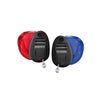 You can enquire for top hearing aids at Listening Lab Malaysia.
You can enquire for top hearing aids at Listening Lab Malaysia.

Earwax, contrary to popular belief, is actually naturally produced by the body to keep the ears protected from foreign particles. However, the excessive buildup of this substance can result in blockage and even temporary hearing loss.
We understand that the thought of it already makes you want to stick a cotton swab inside your ears. But our advice is to learn more about it first and understand when earwax becomes more harmful than useful to your hearing.
What is earwax?
Medically termed as cerumen, these are waxy substances naturally produced in our ear canals. A huge population grow up thinking they’re supposed to clean out earwax. But the truth of the matter is, most often than not, they’re actually exactly where they’re supposed to be. Earwax is secreted by the body as protection from foreign particles. As it moves from the inside going outward, it gathers dead skin cells, hair, and dirt that it then removes as it naturally flakes off without us noticing.
However, while cerumen plays an important role in protecting our ears, too much of it can also pose a risk to your hearing.
What is earwax blockage?
Earwax blockage, also known as cerumen impaction, can occur in different ways. One of the most common causes is when the ear produces more earwax than necessary, making it difficult to come off naturally. When this happens, the cerumen tends to solidify, making it even harder to work its way out. This leads to a blockage.
Hard earwax is more common with people who suffer from medical conditions that cause dry and flaking skin such as eczema. It’s also worthy to note that ageing affects the consistency of our cerumen. As we get older, our bodies produce less but thicker and stickier earwax.
Earwax blockage may also occur due to the use of cotton swabs. Doing this often results in pushing the cerumen further into the ear, causing it to stay in the ear canal longer than usual—long enough that it hardens and creates an obstruction.
Should you get rid of your earwax?
Don’t bother yourself if your ear produces just the right amount of cerumen. Allow these naturally occurring substances to protect your body the way it’s supposed to. Usage of cotton swabs and other cleaning tools just often leads to unnecessary damage to your ears.
However, if you’ve been noticing symptoms of earwax blockage—hearing loss, ringing in the ear, earache, itching, and a feeling that the ear is plugged—we highly encourage you to see a health professional, as these could indicate a more serious underlying condition. Don’t attempt to remove hard earwax yourself by inserting devices in your ear canal. For your own safety, don’t think twice about visiting your trusted doctor.
For professional earwax removal, you can visit Listening Lab in Malaysia. We have self ear cleaning kits with audiologists around to assist you. You can also visit us for a comprehensive hearing test if you are having a problem with your hearing recently.











